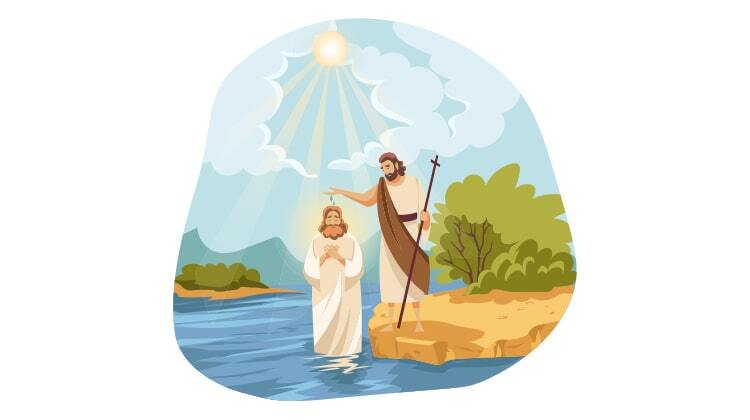Have you ever wondered what it would be like to see God face to face? To walk with Him and talk with Him? Moses was someone who enjoyed a unique relationship with God. The Lord spoke to him through a burning bush (Exodus 3), commissioned him to challenge the ruler of Egypt, empowered him to perform signs and miracles, and appointed him as a spokesman, prophet, and leader of the people. Yet Moses yearned for more. He wanted to see God’s face and behold His glory (Exodus 33:18).
In response, God allowed His glory to pass by Moses as he hid in the cleft of a rock. But the Lord covered Moses with His hand and issued this warning: “You cannot see My face; for no man shall see Me, and live” (Exodus 33:20).
Jesus Is From Eternity
Jesus Is Omnipotent
Jesus Empowers Us
Jesus Is Passionate About Righteousness
God’s presence was a fearful thing in the Old Testament. The tabernacle contained three levels of separation to remind the Israelites that God is not approachable in ordinary ways. Two of Aaron’s sons died when they dared to enter the Lord’s presence in a moment of disobedience (Leviticus 10:1-2). Uzzah, one of David’s elite troops, died when he touched the Ark of the Covenant (2 Samuel 6:6-7). Even the Philistines possessed a healthy fear regarding the things of God (1 Samuel 5:10-12).
But Jesus changed everything. When Philip asked to see the Father, Jesus replied, “He who has seen Me has seen the Father” (John 14:9). God’s only Son became a Man so that we could do what Moses could not—behold God’s glory. From the virgin birth to the Resurrection, Jesus’ divinity is evident in His life. Let’s look at four reasons we can be confident that Jesus is the Son of God.
Jesus Is From Eternity
Micah 5:2 says, “Out of you shall come forth to Me the One to be Ruler in Israel, whose goings forth are from of old, from everlasting.” Let me share something from my book, The Jesus You May Not Know:
Let’s begin with eternity in history. Does that sound like a contradiction in terms? As I’ve indicated, eternity is another of the great mysteries of God—the attribute of infinity in relation to time. The triune God has always existed. Past, present, and future, as we conceive them, are eternally present in the mind of God. The Father, Son, and Holy Ghost live in the eternal present. But for us who are living in the realm of time, we think in terms of past eternity and future eternity—and of the present tense passing with each ticking second. It’s hard to grasp that, isn’t it?...
During His lifetime on earth, Jesus ministered within the constraints of time, but He is eternal by nature. Being God, He has always existed without a beginning and with no end. He was, and is, and is to come. He existed endless ages before He descended to earth as a human through the virgin birth in Bethlehem….
Jesus was alive in the days of Abraham. He was alive when the world was created. In fact, the Bible teaches He was the Creator.
The only way we can begin to appreciate the gift of eternal life is to come to terms with our eternal Savior. In Revelation 21:6, Jesus described Himself as “the Alpha and the Omega, the Beginning and the End.” As the Son of God, Jesus stands at the beginning of creation (Genesis 1–2) and the end (Revelation 21–22). We cannot understand eternity perfectly, but we can study what God has revealed through Scripture.
Jesus Is Omnipotent
Throughout the Gospels, we find astounding accounts of the supernatural power of Jesus. He performed miracles, fed multitudes, raised the dead, defied the devil, and lifted the spirits of those He met. The Lord demonstrated His authority across every realm of reality. Even His disciples marveled, “Who can this be, that even the winds and the sea obey Him?” (Matthew 8:27) Let’s look at the power Jesus exercised on earth and the power He promised to us.
As the Son of God, Jesus exists beyond the laws of nature, and His miracles prove it. But there is something else, something shocking, that we need to understand. He told Philip, “Most assuredly, I say to you, he who believes in Me, the works that I do he will do also; and greater works than these he will do, because I go to My Father” (John 14:12).
How can we perform more wondrous works than Jesus? When the Lord returned to heaven, He poured His Holy Spirit onto the Church as a gift from the Father. While Jesus was on earth, He was localized. Now the Holy Spirit dwells within His followers around the world.

Jesus, the Son of God, gave us the privilege of presenting the Gospel and leading others to Him—a ministry that leads to permanent and eternal change. His miracles met physical needs and pointed to spiritual truths, but they were temporary. The people He brought back to health and life eventually went to their graves. The winds and waters He quieted have since stirred. Jesus temporarily subdued Satan and his demons, but they continued their work of deceiving people. Healing sickness of the soul is a greater miracle than healing sickness of the body.
Jesus Empowers Us
The disciples couldn’t imagine what Jesus expected them to do. When they suggested that He send away a hungry multitude, He replied, “You give them something to eat” (Mark 6:37). He wanted them to feed five thousand men plus women and children? Philip calculated that it would require more than two hundred days of wages to provide food for so many people. Even if the disciples pooled all their money, the problem greatly exceeded their resources.
One little boy stepped forward and offered his lunch. It was meager even for a child—five small, flat barley wafers and two fish, probably about the size of sardines. But Jesus could use that. He thanked His Father for the food, broke it, fed everyone there, and had baskets full of leftovers afterward. Apparently, the boy had enough faith to recognize what the disciples could not: God can use whatever gifts we offer, no matter how small.

God created the world with no help from us. But since then, He has chosen to use human beings as His instruments of grace and provision on earth. There is nothing we can give the Lord outside of what He has given to us, yet He invites us to participate in His kingdom work. Even though He can accomplish anything and everything simply by willing that it be done, the Son of God creatively involves us in His ministry of meeting needs. In the process, we learn about Him and ourselves as well.
Use the provisions you have—talents, time, finances, and opportunities—to serve the Lord. Even if it seems inadequate, trust that God will mightily use anything you bring to Him.
Jesus Is Passionate About Righteousness
Most people today do not fully understand the kind of person Jesus was. The idea of Him as “lowly, meek, and mild” falls short of capturing His strength, passion, commitment, and courage. In Matthew 16, He asked His disciples who people believed Him to be. They replied, “Some say John the Baptist, some Elijah, and others Jeremiah or one of the prophets” (verse 14). These men are three of the most courageous, rugged, fiery prophets in the Bible. If Jesus had been as passive as He is often portrayed, He never would have been mistaken for such individuals.
In his letter to Titus, the apostle Paul described Jesus’ passion and purpose in coming to earth this way: “For the grace of God that brings salvation has appeared to all men, teaching us that, denying ungodliness and worldly lusts, we should live soberly, righteously, and godly in the present age, looking for the blessed hope and glorious appearing of our great God and Savior Jesus Christ, who gave Himself for us, that He might redeem us from every lawless deed and purify for Himself His own special people, zealous for good works” (Titus 2:11-14).
A passage in John 2 provides a glimpse of Jesus’ zeal. In preparation for the Passover Feast, Jews packed the city of Jerusalem. Each family was required to sacrifice a lamb on the day of the Passover and eat it that evening. The temple priests were using the pilgrimage for their advantage—selling sacrificial animals at inflated prices. As Jesus watched His Father’s representatives exploit others, a sense of righteous indignation filled His heart in a way we do not find elsewhere in Scripture (verses 15-16).
Jesus did not hesitate to act. With a whip, He drove the animals and sellers and moneychangers out of the temple court, turning over their tables and spilling their coins on the ground. The Son of God could not bear the thought of dishonest priests defaming His Father’s house, and He accused the priests of turning the temple into a “house of trade” (ESV). Jesus’ fervor reminded the disciples of David’s zeal for the house of the Lord, which is recorded in Psalm 69:9.
When Jesus turned over tables in the temple, He gave us a small preview of what it will be like when He purifies this world at the end of the Tribulation. Here is what the apostle John tells us about Christ’s triumphant return:
Now I saw heaven opened, and behold, a white horse. And He who sat on him was called Faithful and True, and in righteousness He judges and makes war. His eyes were like a flame of fire, and on His head were many crowns. He had a name written that no one knew except Himself. He was clothed with a robe dipped in blood, and His name is called The Word of God. And the armies in heaven, clothed in fine linen, white and clean, followed Him on white horses. Now out of His mouth goes a sharp sword, that with it He should strike the nations. And He Himself will rule them with a rod of iron. He Himself treads the winepress of the fierceness and wrath of Almighty God. And He has on His robe and on His thigh a name written: KING OF KINGS AND LORD OF LORDS (Revelation 19:11-16).

Until then, we can face trials and injustices with peace in our heart, knowing the eternal, all-powerful Son of God is coming back to right every wrong and purify this world.
No ordinary human being could make the claims Jesus made and back them up with supernatural power. No one but the Son of God could live with such passion and purity. Only Jesus could turn our humble offerings into instruments of grace and provision. And by knowing the Son of God, we can know the Father (John 14:7).
